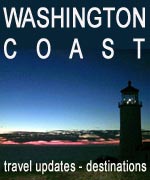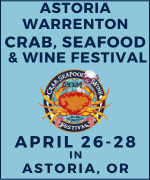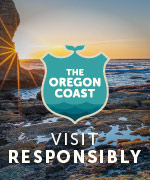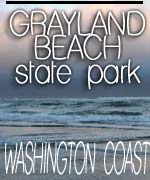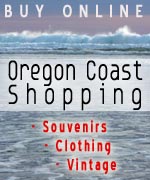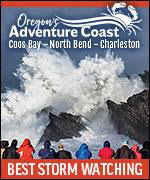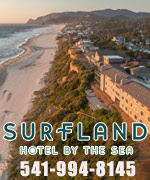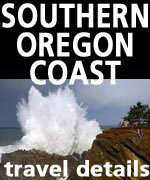Forgotten Oregon Coast History: Natatoriums of Seaside, Cannon Beach
Updated Periodically
By Oregon Coast Beach Connection staff
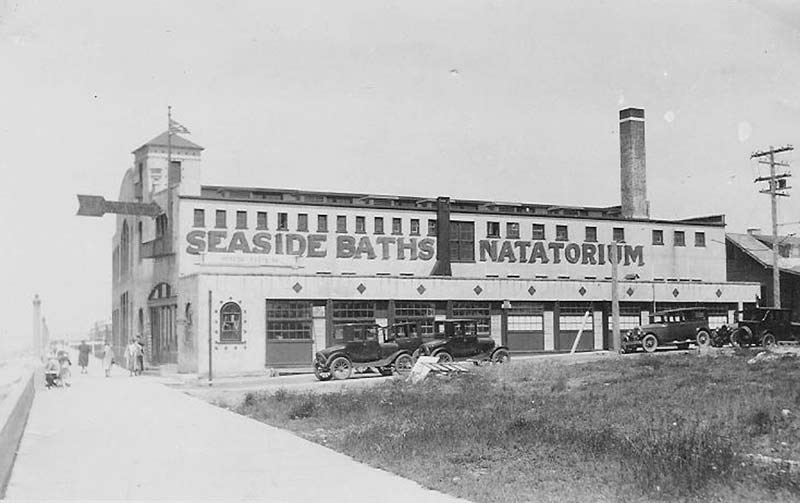
(Seaside, Oregon) – Back in the day – if you define “the day” as 100 years ago – natatoriums were a big deal on the Oregon coast. From about 1910 until the '30s, these were the meeting places and hotspots for fun along much of the coastline. You'd find these heated sea water baths in Newport's Nye Beach, Bayocean (a ghost town near Tillamook that is completely disappeared), at Rockaway Beach, in Cannon Beach – and most famously in Seaside. (Photo: One natatorium in Seaside became the Seaside Aquarium).
In fact, Seaside had two for a time. Only one of those buildings still stands out of all them: the place we now know as Seaside Aquarium. But it will also surprise many that there was one in Cannon Beach as well.
It's a fascinating little side trip down north Oregon coast history.
Each had plenty of differences, but one thing was always the same: sea water was pumped in from the ocean not far away and heated, creating a warm salt water swimming experience. Some had places for bands to play: at first more traditional forms of music and then featuring jazz bands, once that genre was no longer taboo. Others had features now laughably primitive by today's standards, but an important facet back then.
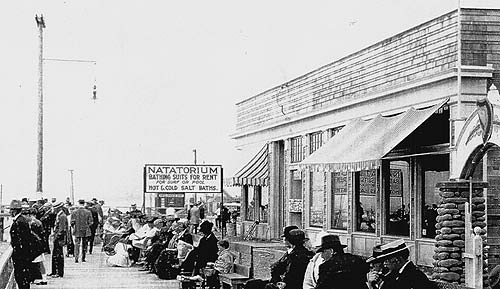
Sometime around 1914 or so, the Seaside Natatorium was born. Located on the newly-built Prom (although the Prom was still wooden then, not concrete), it sat on the corner of the Turnaround – on the right side, if you're gazing down Broadway. Little is written about this one, except that it was of a considerable size at its height, according to photos.
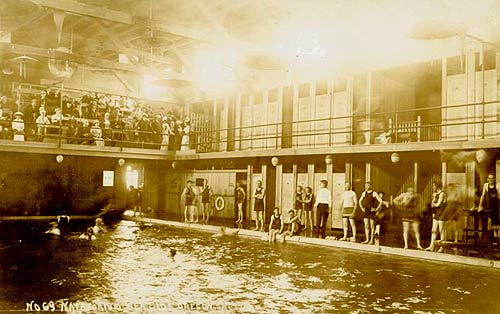
What is known is that it was originally part of a building called the Turn Around Building, and was also called Oates Natatorium at some point. In its initial days, it was surrounded by various shops, including an ice cream and candy seller, a cigar stand, a barber shop, a photography seller and an Oregon Woolen Mills Store.
One postcard of the place from 1947 on display at Seaside's history museum had the following description: "Constantly changing, filtered, chlorinated and heated pure water circulates through the several plunges. Between the large pools is an everflowing warm shower. Besides galleries for visitors there is a special passage from the well-kept dressing rooms to the ocean beach."
At one point, perhaps about the '40s or '50s, it became a “Swim n' Skate.”
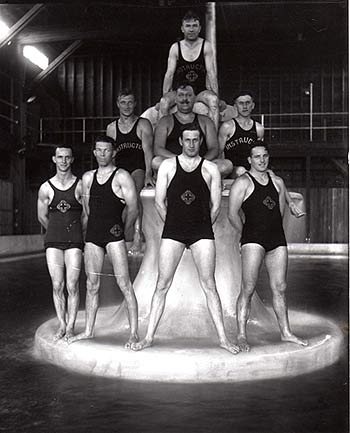 Then for a short time, circa 1960, it housed an ages nightclub called the Pypo Club upstairs, above the skating and swimming area. The Pypo soon moved a ways north, and became rather famous in the early 1960s music scene in Oregon for hosting bands like Gene Vincent, the Wailers, Paul Revere and the Raiders and other big names at the time. (At right: lifeguards at the Seaside Baths Natatorium posing where a massive fish tank is now at Seaside Aquarium).
Then for a short time, circa 1960, it housed an ages nightclub called the Pypo Club upstairs, above the skating and swimming area. The Pypo soon moved a ways north, and became rather famous in the early 1960s music scene in Oregon for hosting bands like Gene Vincent, the Wailers, Paul Revere and the Raiders and other big names at the time. (At right: lifeguards at the Seaside Baths Natatorium posing where a massive fish tank is now at Seaside Aquarium).
How long it was in operation as a natatorium and then as a business with skating added isn't clear. However, what's well known is that the Seaside Baths Natatorium was created in 1924, about two blocks away – to try and cash in on the natatorium craze.
That building eventually became the Seaside Aquarium – but that's jumping ahead.
The Seaside Baths Natatorium was also a multifaceted place of entertainment for families, though not as long lasting. Keith Chandler, manager of the Seaside Aquarium, said this one had a big fountain in the middle where you could sit and get sprayed on. There was a wading pool out front for the kiddies, which had large windows facing the ocean. That's about where the seals hang out now at Seaside Aquarium.
“There was a diving board so you could jump in,” Chandler said. “A high diving board.”
The windows in the front were much different than they are now, Chandler said. These were shorter in length but much higher, with a half arch shape.
There were also balconies where people could hang out and watch others swim.
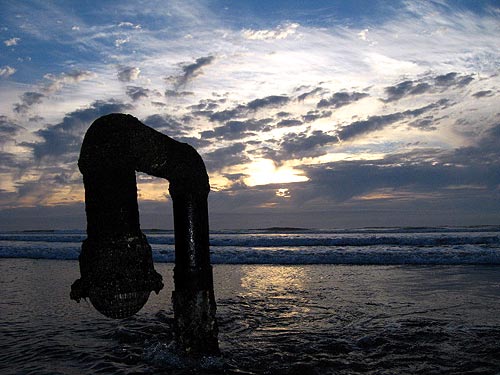
One thing is almost the same about the Seaside Aquarium, however: the pipe that funneled water from the ocean into the natatorium still does so for the aquarium. The same pipe worked for the aquarium until the '60s, when a log wrecked the intake area. But some parts of that lengthy pipe are still the same from back then.
The pipe sits six to 20 feet under the sand, depending on its location. Regular visitors to the area will notice it occasionally changes shape out on the tide line. This is because sands shift and they need to periodically reconfigure it to keep it from being smothered.
The Great Depression killed the Seaside Baths Natatorium in 1932. For a brief period, owners tried wrestling matches for entertainment and a salmon farm, but those too failed.
In 1937, the Seaside Aquarium was opened, and initially featured a lunch counter as well. A year later, the highest portion of the aquarium got its own floor – the third floor – and that section became the Sea Water Apartments. The apartment area existed until the late '70s. Remnants of it still exist today, although the floors are rickety and never used. However, the aquarium's Tiffany Boothe periodically photographs up there, and you get to see ghostly leftovers of people's lives and furniture, like old beds and a board showing the names of the last people who resided there.
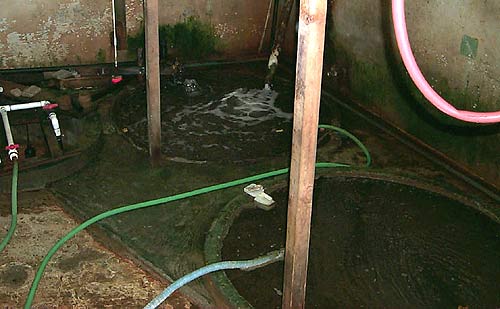
Parts of the old pool are still used at the aquarium. In a dark basement area beneath the fish tanks and holding areas, out of sight from the public, there's a sunken section with three really large holes in it. This is the former deep end of the pool, Chandler said, and the holes are the filters for the seawater that feeds into the tanks. Each hole spills into another, until water is finally pumped from the bottom of the third filter. Without that, he said, the water would be too murky for the public to see into the tanks.
I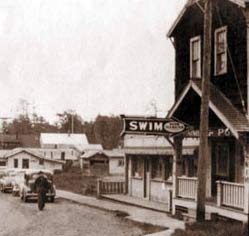 n Cannon Beach, that town got its natatorium in 1924, where the Whale Park now sits at the big turn in downtown. This hosted up to 200 people with a 30-foot by 60-foot pool of heated salt water. Their pipe was extended into Elk Creek to bring in the recreational fun. (At right, Cannon Beach natatorium photo courtesy Cannon Beach Historical Society).
n Cannon Beach, that town got its natatorium in 1924, where the Whale Park now sits at the big turn in downtown. This hosted up to 200 people with a 30-foot by 60-foot pool of heated salt water. Their pipe was extended into Elk Creek to bring in the recreational fun. (At right, Cannon Beach natatorium photo courtesy Cannon Beach Historical Society).
Like the two in Seaside, this one also had a balcony, but it also had a jukebox where people did the Jitterbug and other jazz-era dances, while also people-watching. An added extra: they had movies playing on the outside wall after dark. One curious feature was a set of private bathrooms that could be used for 25 cents, which was helpful to those staying in beach cottages that didn't have actual plumbing.
The “Nat,” as it was called, managed to survive the Great Depression. But about 1942, wartime rations and a shortage of chlorine and heating oil killed off Cannon Beach's natatorium too. Oregon Coast Hotels in these areas - Where to eat - Maps and Virtual Tours
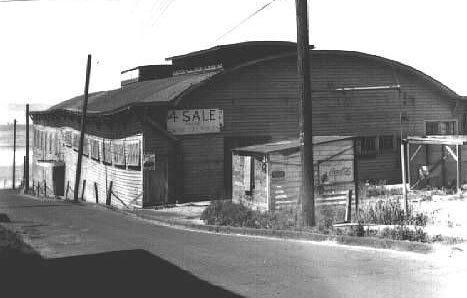
There were also natatoriums in Bayocean, Rockaway Beach and Newport: Nye Beach Natatorium a Distinctive Part of Newport / Oregon Coast History
More About Oregon Coast hotels, lodging.....
More About Oregon Coast Restaurants, Dining.....
Cannon Beach Lodging
Nehalem Bay Lodgings
Manzanita Hotels, Lodging
Three Capes Lodging
Pacific City Hotels, Lodging
Lincoln City Lodging
Depoe Bay Lodging
Newport Lodging
Waldport Lodging
Yachats Lodging
Oregon Coast Vacation Rentals
Oregon Coast Lodging Specials
LATEST Related Oregon Coast Articles
Likely just before dawn best hour but peak happens during daylight. Weather
Dark Sky Week is Prime Along Oregon Coast: Where and Where Not to Go
General guide to dark sky viewing from south to north coast. Astronomy
Sizable Price Drop, Deals in Lincoln City During Quiet of April on Central Or...
20 perc off at A1 Vacation Rentals across its roster, including Gleneden Beach. Lincoln City specials
Upcoming S. Oregon Coast Events Include Gem Show, History: Coos Bay, Bandon
May 6 talk at Coos History Museum, Mayfly Fest May 17, Bandon Rock / Gem Show June 7,8
Back to Oregon Coast
Contact Advertise on BeachConnection.net
All Content, unless otherwise attributed, copyright BeachConnection.net Unauthorized use or publication is not permitted





